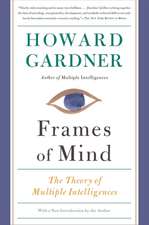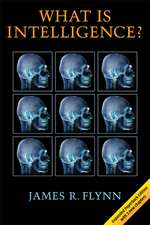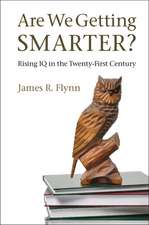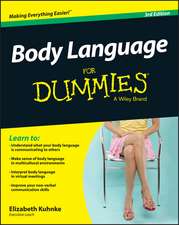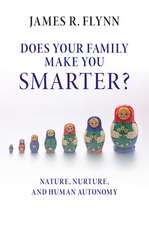A History of Intelligence and 'Intellectual Disability': The Shaping of Psychology in Early Modern Europe
Autor C.F. Goodeyen Limba Engleză Paperback – 14 oct 2024
The Open Access version of this book, available at http://www.taylorfrancis.com/books/e/9781315564838, has been made available under a Creative Commons Attribution-Non Commercial-No Derivatives 4.0 license.
| Toate formatele și edițiile | Preț | Express |
|---|---|---|
| Paperback (1) | 298.62 lei 3-5 săpt. | +31.66 lei 7-13 zile |
| Taylor & Francis – 14 oct 2024 | 298.62 lei 3-5 săpt. | +31.66 lei 7-13 zile |
| Hardback (1) | 1236.77 lei 6-8 săpt. | |
| Taylor & Francis – 28 iun 2011 | 1236.77 lei 6-8 săpt. |
Preț: 298.62 lei
Preț vechi: 314.34 lei
-5% Nou
Puncte Express: 448
Preț estimativ în valută:
57.14€ • 62.26$ • 48.15£
57.14€ • 62.26$ • 48.15£
Carte disponibilă
Livrare economică 02-16 aprilie
Livrare express 19-25 martie pentru 41.65 lei
Preluare comenzi: 021 569.72.76
Specificații
ISBN-13: 9781032920696
ISBN-10: 1032920696
Pagini: 392
Dimensiuni: 174 x 246 x 25 mm
Greutate: 0.73 kg
Ediția:1
Editura: Taylor & Francis
Colecția Routledge
Locul publicării:Oxford, United Kingdom
ISBN-10: 1032920696
Pagini: 392
Dimensiuni: 174 x 246 x 25 mm
Greutate: 0.73 kg
Ediția:1
Editura: Taylor & Francis
Colecția Routledge
Locul publicării:Oxford, United Kingdom
Public țintă
AcademicCuprins
Contents: Introduction; Part 1 Problematical Intellects in Ancient Greece: Ancient philosophy and the 'worst disability'; Aristotle and the slave's intellect. Part 2 Intelligence and Disability: Socio-Economic Structures: The speed of intelligence: fast, slow and mean; Quick wit and the ingenious gentleman. Part 3 Intelligence and Disability: Status and Power: In-group and out-group: the place of intelligence in anthropology; Honour, grace and intelligence: the historical interplay; 'Souls drowned in a lump of flesh': the excluded. Part 4 Intelligence, Disability and Honour: Virtue, blood, wit: from lineage to learning; 'Dead in the very midst of life': the dishonourable and the idiotic. Part 5 Intelligence, Disability and Grace: From pilgrim's progress to developmental psychology; The science of damnation: from reprobate to idiot. Part 6 Fools and Their Medical Histories: The long historical context of cognitive genetics; The brain of a fool; A first diagnosis? The problem with pioneers. Part 7 Psychology, Biology and the Ethics of Exceptionalism: Philosophy, the devil and 'special people'; The wrong child: changelings and the bereavement analogy; Testing the rule of human nature: classification and abnormality. Part 8 John Locke and his Successors: the historical contingency of disability; Works cited; Index.
Notă biografică
C.F. Goodey has researched and published on the history of 'intellectual disability', including the ethical and social implications of the concept, for more than 20 years. His articles have appeared in a number of scholarly journals, including History of Science, Medical History, History of the Human Sciences, Political Theory and Ancient Philosophy. He formerly held teaching and research posts at Ruskin College, Oxford, the Open University and the University of London Institute of Education, and is currently an independent consultant working for national and local government services on learning disability in the UK.
Recenzii
A Yankee Book Peddler UK Core Title for 2011 'The publication of A History of Intelligence and 'Intellectual Disability' constitutes a major event. Anyone interested in psychology, philosophy, ethics, and English literature, as well as medieval, early modern, eighteenth-century, and disability studies should take note of it. Twenty years of research went into this book, which presents a history of ideas ranging from the ancient Greeks to the current period. It is thorough, rigorous, comprehensive, and painstaking in its analysis while also being simultaneously measured and provocative in its conclusions. With regard to disability studies, I suggest that this book ranks among its best scholarship. I further suggest that this is the MOST significant book coming out of disability studies to focus exclusively on intellectual disability... More importantly, no other study exists (that I know of at least) that goes to the tremendous lengths (breadth, depth, complexity, layering, self-questioning) that this one does, and so successfully. In terms of style, Goodey knows his way around a metaphor and at times can be humorous. The writing alone makes this an enjoyable read.' Chris Gabbard, Department of English, University of North Florida 'This superb interdisciplinary study analyzes a wide range of texts from antique philosophy, religion, medicine, and psychology, to show how the history of disability is intertwined with that of social and cultural formations. A must read for all who want to know how their own discipline organized the world of understanding in a way that made some human beings invisible at best, and despicable at worst.' Hans Reinders, VU University, Amsterdam 'Goodey shows the influence of social, political, and religious factors that shaped the pre-modern and early modern views of intelligence and of lack-of-intelligence. In so doing, he has created a magisterial work - one that should be read by historians, sociologists, policy makers, and students of
Descriere
Autism, Down syndrome, and other such labels assume that 'intellectual disability' is a permanent aspect of human nature. C.F. Goodey demonstrates that intellectual disability and even intelligence are instead historically contingent creations, which are rooted in early modern cultural and religious matrices and corresponding forms of social organi







